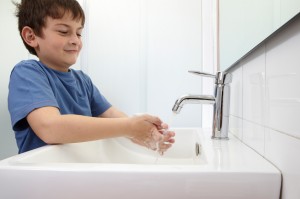 By now you’ve probably seen news reports about the outbreak of enterovirus D68 (EV-D68) that’s been sweeping across the country, resulting in many children being hospitalized for difficulties with breathing. While there are no confirmed cases of EV-D68 in Washington state, Seattle Children’s has seen cases of severe respiratory disease in many patients who have tested positive for enterovirus or rhinovirus. The Centers for Disease Control and Prevention (CDC) is doing further testing to determine if any of these cases are EV-D68.
By now you’ve probably seen news reports about the outbreak of enterovirus D68 (EV-D68) that’s been sweeping across the country, resulting in many children being hospitalized for difficulties with breathing. While there are no confirmed cases of EV-D68 in Washington state, Seattle Children’s has seen cases of severe respiratory disease in many patients who have tested positive for enterovirus or rhinovirus. The Centers for Disease Control and Prevention (CDC) is doing further testing to determine if any of these cases are EV-D68.
The primary message for parents worried about their own children: Be on alert, wash hands frequently, and see a doctor or take your child to an emergency room immediately if he or she is having difficulty breathing or wheezing.
Below are answers to some of the other common questions regarding enterovirus:
What are enteroviruses and when should my child see the doctor?
Enteroviruses are common viruses that can cause respiratory illness, fever and rash. Other mild symptoms include runny nose, sneezing, cough and body and muscle aches. Enterovirus D68 is one type of enterovirus that has previously been rare in the U.S.
Infants, children and teenagers are most likely to get infected and become sick. Severe symptoms of enterovirus may include trouble breathing and wheezing. Children with asthma or other chronic lung disease appear to be more susceptible to serious illness.
People with mild enterovirus infections do not need to see a doctor and do not need to be tested. Use the same judgement as usual to decide if your child should see a doctor. You know your child best. If your child doesn’t look or seem right, please talk with your child’s doctor.
Anyone having a hard time breathing or who appears seriously ill should be evaluated by a healthcare provider immediately. Seek medical help right away if a child with asthma has trouble breathing and worsening respiratory symptoms that do not improve as expected with their usual medicines.
How does enterovirus D68 spread and how can an infection be prevented?
EV-D68 can be found in respiratory secretions such as saliva and mucus. The virus likely spreads from person to person when an infected person coughs or sneezes, or a person touches contaminated surfaces.
There is no vaccine for enterovirus infections, but you can help protect yourself and your family by following these steps:
- Wash your own and your child’s hands often with soap and warm water (there is some evidence that hand washing is better than alcohol hand sanitizers at killing enteroviruses). Wash for at least 20 seconds. Children should sing their ABCs twice in a row while washing their hands to ensure the proper length of time.
- Avoid people who are sick.
- Stay home from daycare, school or work when sick. If fever is present, stay home while sick and for at least one day after the fever is gone, without the use of fever-reducing medicines.
- Cover noses and mouths when coughing or sneezing: use tissue or the crook of your elbow when you cough or sneeze and throw the tissue away in a covered trash bin.
- Remind children to keep their hands away from their face to avoid touching their eyes, nose or mouth.
- Clean surfaces often, including toys, doorknobs, phone receivers and keyboards.
- Avoid sharing personal items, such as forks, spoons, toothbrushes and towels.
- People with asthma should make sure their asthma symptoms are under control. Seek medical help right away if a child with asthma has trouble breathing and worsening respiratory symptoms that do not improve as expected with their usual medicines.
How is enterovirus treated?
Like the common cold, there is no specific treatment for enterovirus infections. Some people with severe respiratory illness may need to be hospitalized and receive intensive supportive therapy.
What is Seattle Children’s doing to keep patients and families safe?
Patient safety is Seattle Children’s highest priority and the hospital is taking steps to protect all of our patients, families and staff.
- For any hospitalized patients who test positive for rhinovirus or enterovirus, Seattle Children’s will continue to work closely with Public Health-Seattle and King County to determine if EV-D68 testing is needed.
- We are keeping up to date on the latest recommendations and precautions from the CDC.
- Seattle Children’s is also taking the necessary steps to prepare in the event that an EV-D68 outbreak occurs in our region and a large number of patients seek care in our emergency department or are hospitalized with respiratory illness.
- Staff are cleaning their hands frequently to prevent the spread of infections.
- We will be screening patients, families, staff and visitors for symptoms.
- We are putting patients with respiratory infections in isolation. Per the hospital’s usual procedure, this means staff will wear gowns, masks and, when needed, eye protection while delivering care to hospitalized patients.
For additional information about enterovirus EV-D68, please visit Seattle Children’s webpage on Enterovirus D68 (EV-D68) or the Public Health — Seattle & King County and CDC websites.

